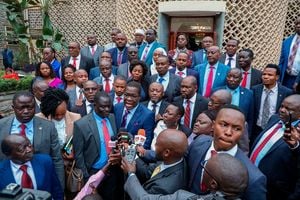
The ongoing national debate and civic action on the 2024/2025 budget and Finance Bill has inspired a critical constitutional question: can electorates recall their Member of Parliament (MP) before the end of their electoral five-year term - that is before August 2027?
The answer to this question is to be found in five places. Article 1; Article 104; the Elections Act; the County Governments Act.
Finally, it is to be found in a case brought by Katiba Institute and Transform Empowerment Action Initiative (TEAM) and decided by the High Court in 2017 on the constitutionality of provisions of recall in Elections Act and County Governments Act.
Sovereignty of the People
Let’s start with Article 1 and 104. Article 1 is straightforward, it provides that all sovereign power belongs to the people and they may exercise it directly or through representatives.
The import of Article 1 is that the people ultimately have the last word on how constitutional power is to be exercised. This includes the power to delegate or withdraw delegation to their representatives.
This then takes me to Article 104(1). It provides that the electorate “have the right to recall the member of Parliament representing their constituency before the end of the term of the relevant House of Parliament.”
This then begs the question: but how is recall done?
The “how” starts with Article 104(2) – which required parliament “to enact legislation to provide for the grounds on which a member may be recalled and the procedure to be followed”.
The Elections Act, which parliament enacted in 2011, included provisions on the grounds and procedure for recall of MPs as ordered by Article 104 of the constitution.
The same recall provisions were replicated in the County Governments Act, this time for recall of Members of County Assembly (MCA).
But there was a problem. Parliament, through obvious mischief, made sure the legal provisions it had enacted made recalling an MP or MCA impossible.
This is why Katiba Institute and TEAM moved to Court in 2016 to have the recall law declared unconstitutional.
The Court substantially agreed with Katiba Institute and invalidated substantial parts of the recall provisions in both Elections Act (for MPs) and the County Governments Act (for MCAs) invalidating the most problematic provisions including the requirement that a recall petition could only be initiated after the Court confirmed the grounds of recall and that the recall vote only succeeded – listen to this – if a majority of registered voters in a constituency (no; not a simple majority of those voting) supported the recall vote.
In another unsurprising self-serving move, MPs amended the County Governments Act in 2020 in line with the judgment in Katiba Institute case to make it possible to recall MCAs but have never reviewed the provisions in Elections Act which relates to their recall.
Constitution anticipates sabotage
The constitution (and Courts) recognize that a right cannot be denied or frustrated just because parliament has failed to enact a law to provide how that right should be exercised. In such instance, the responsible body must find ways to facilitate the enforcement of the right when required to.
Consequently, between the Constitution, what was left of the recall provisions in the Elections Act, the new provisions on recall in County Governments Act and the Court judgment in Katiba Institute case, there is sufficient (and clear) guidance to help the voter exercise the right of recall and for the Independent Electoral Boundaries Commission (IEBC) to facilitate the exercise of recall.
Step-by-step of undertaking recall
So, what does one need to do to recall an MP? Three things.
First, a voter(s) who wishes to recall their MP should prepare and file a petition for recall with the IEBC. The petition, which must be signed by the voter(s) should indicate the grounds for recall and be accompanied by “the fee prescribed for an election petition.”
The “fee” here is the equivalent of court fees a person who challenges an election of an MP pays when they initiate an election petition. Currently that fee is thirty thousand and fifteen thousand shillings for MP and MCA respectively.
Concerning the grounds of recall: Parliament – in the amended County Governments Act – has now provided that the grounds for recalling an MCA include incompetence, gross misconduct and gross violation of the constitution.
These grounds are – through constitutional logic – equally applicable in the recall of an MP.
This is what Speaker Moses Wetangula – when trying to impress Hon Peter Salasya – would refer to as pari passu application, meaning the law must apply in equal measure among similar subjects.
Relevantly, there is a strong argument to be made that when MPs take actions that are egregiously and overtly contrary to the wishes of the people or that fail to respect or are calculated to undermine foundational principles of the constitution such as public participation, they are either incompetent or they have grossly misconducted themselves or both. In fact both.
The second step involves collecting names and signatures of at least a third of the registered voters from the constituency in support of the recall petition.
The law says those signing to support recall must be registered in different parts of the constituency, not just one ward or locality.
The names of the voters must be supplied to the IEBC within thirty days of filing the petition for recall.
IEBC is required to verify the list of names supporting recall within thirty days of being supplied with it after which it must issue a notice of recall to the speaker in fifteen days. But this does not mean an MP has been recalled yet.
The third step involves IEBC preparing for and conducting a recall vote. That must happen within ninety days from the date when the notice of recall was issued to the speaker.
The ballot of the recall election contains a simple ‘yes’ or ‘no’ question with symbols on the ballot paper denoting each side. Again, a reminder, a recall election succeeds if more than a simple majority votes in support of the recall.
Obviously, where the recall process succeeds, the concluding act is the holding of a by-election to elect a new MP. That election is conducted like any by-election.
Constitution takes no prisoners
Recall is a potent tool for citizens to express their disapproval with the manner their MP is undertaking their parliamentary duties.
MPs fully understand this potency and have previously done whatever they could – especially through legislative subterfuge - to frustrate the possibility of voters recalling them.
But, remember, the constitution has a take-no-prisoners attitude and has already provided the edict for recall.
The constitution, together with surviving recall provisions in the Elections Act and County Governments Act– and the clarification made by the Court in the Katiba Institute case – sketches a relatively clear and now less onerous path for recall.
Regardless, it is naïve to expect that MPs will ever be patriotic and magnanimous enough to legislate on a more clearer and facilitative recall process.
Citizens must work with what they have now – and initiate recall processes against those MPs who have exhibited contumacious disregard of their delegated mandate and an outright disdain for the electorate.
@waikwawanyoike is strategic litigator and a constitutional lawyer









